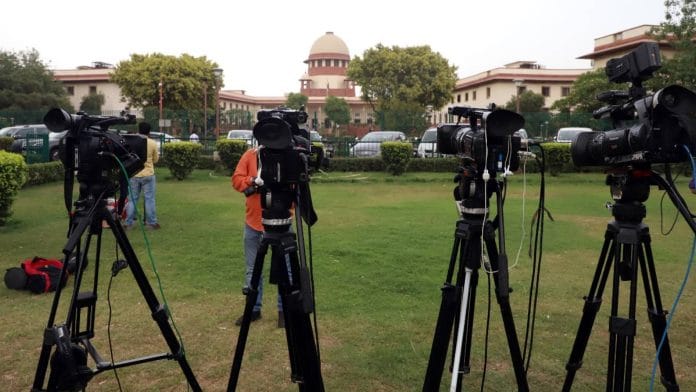New Delhi: The Supreme Court has drawn a hard line against the growing “reel and influencer culture” within its corridors, issuing an absolute ban on photography and videography inside its high security zone, except for official purposes. Violators will face strict disciplinary action.
Long in talks, the assertive and unequivocal directive was issued in a circular Wednesday.
The ban includes mobile phones and equipment such as cameras, tripods and even selfie sticks which have become synonymous with “reel” creation. Usage of mobile phones for photography or videography is prohibited in the lawn of the high security zone, says the circular.
While media personnel may continue to conduct interviews and live broadcasts, they are restricted to a designated lawn area in the low security zone, according to the circular.
The court has warned of strict repercussions for violators. Advocates, litigants, interns or law clerks found breaching the ban will face action from the “Bar Association or State Bar Council” concerned.
For media personnel, violation of rules could mean suspension of access to the high security zone for one month. Supreme Court staff or other stakeholders could also face disciplinary proceedings, with the heads of their departments asked to take strict action.
Significantly, the circular empowers security personnel with the “right to disallow any individual”, staff member, advocate or visitor, from taking photographs or making videos inside the high security zone.
The circular comes in the wake of the Supreme Court Bar Association (SCBA) passing a resolution on 1 September, addressing the creation and use of social media content by advocates within court premises.
The SCBA urged action against advocates making reels or promotional content, stressing the need to “uphold the dignity of the institution and prevent indirect solicitation of work”.
In its resolution, the SCBA mandated a complete prohibition on videography and creation of reels by advocates within court premises. It banned filming, recording, selfies or any form of social media content inside corridors, lobbies and courtrooms, unless explicit permission is granted.
According to the SCBA resolution, violators may face disciplinary measures ranging from warning letters to suspension of membership from the bar association. The SCBA also plans to report erring advocates to their respective state bar councils and has recommended police deployment to ensure compliance.
In a proactive measure, the SCBA stated it will conduct workshops and awareness sessions, especially targeting younger advocates, guided by senior members of the bar to sensitise about responsible social media use and the consequences of violating regulations.
Also Read: Luxury cars, big deals & 6-figure fees, evolution of the boardroom lawyer in India
Broader crackdown
The Supreme Court’s strict circular is the latest in a series of measures by bar councils across India against legal advertising through social media and short-form content.
The Bar Council of Delhi, in a notice on 4 August, flagged the rise of “self-styled legal influencers” spreading misinformation without proper credentials.
Senior members of the bar have been consistent in warning against the growing reel culture in courts, as it often transgresses to solicitation of work which is prohibited under the Advocates Act.
“These reels are complete violations of the rule of professional conduct laid down by the Bar Council. This amounts to attracting and alluring people to come to you and hand over their briefs to you, which is not allowed,” Ved Prakash Sharma, co-chairman of the Bar Council of India since 2019 and a former chairman of the Bar Council of Delhi, had told ThePrint.
On 17 March this year, the Bar Council of India had issued a nationwide directive condemning influencer-style promotions and reels on matrimonial disputes, taxation, intellectual property, and privacy rights. It urged state bar councils to act under the Advocates Act to curb misleading and promotional content in the legal profession.
(Edited by Nida Fatima Siddiqui)
Also Read: Marital disputes to loan fraud, private detectives are Indian legal system’s secret search engine






